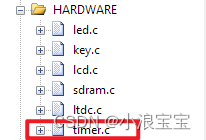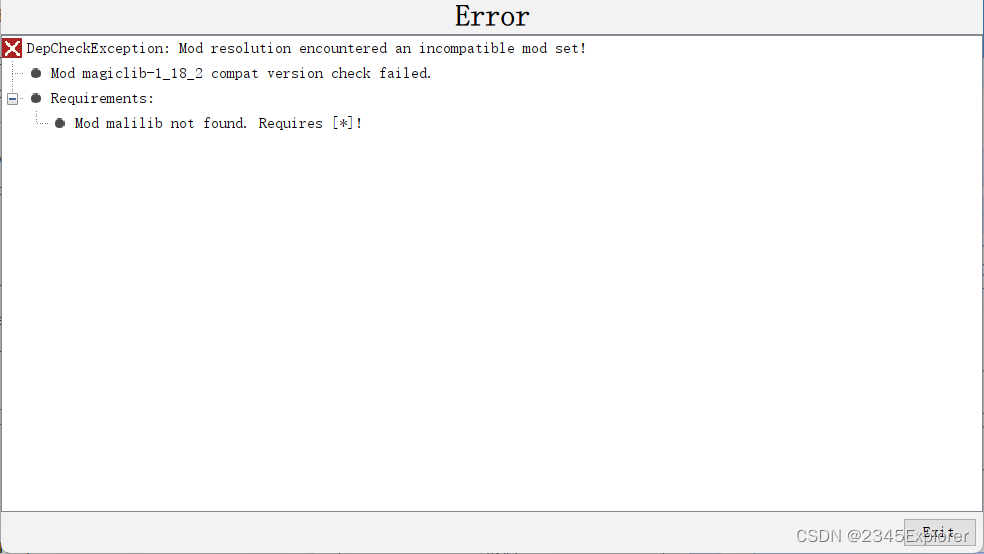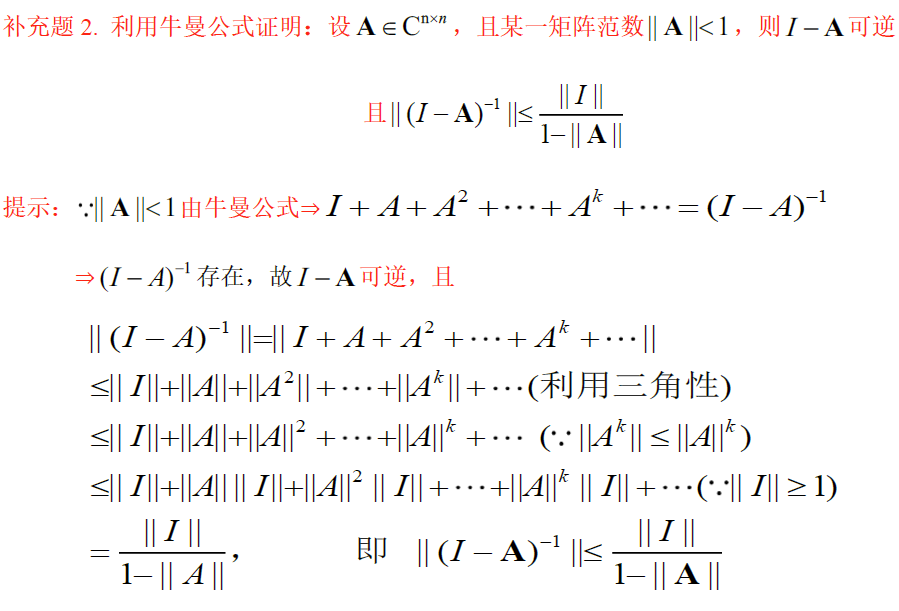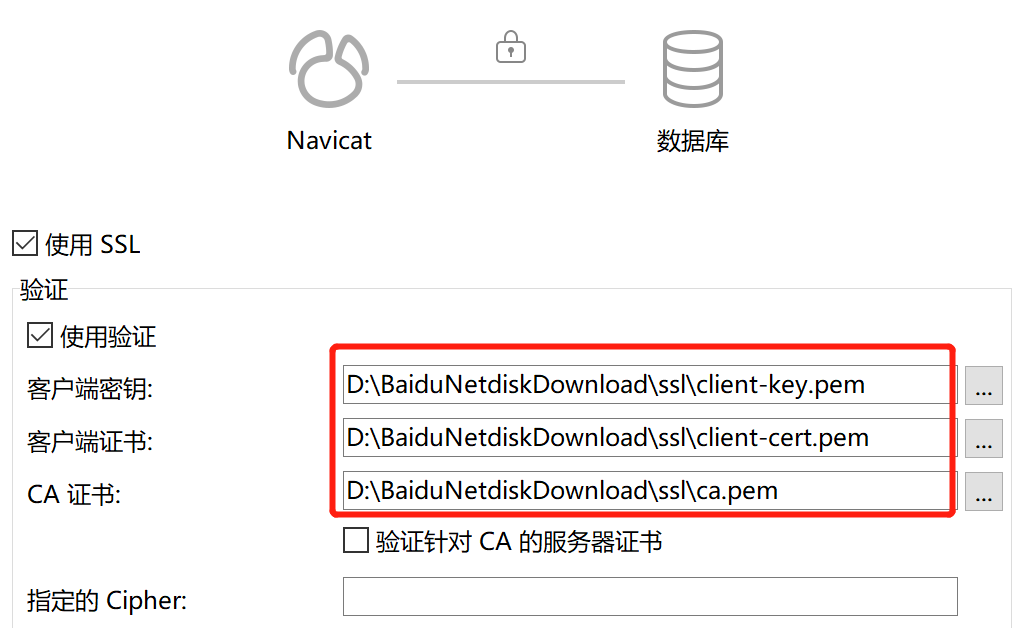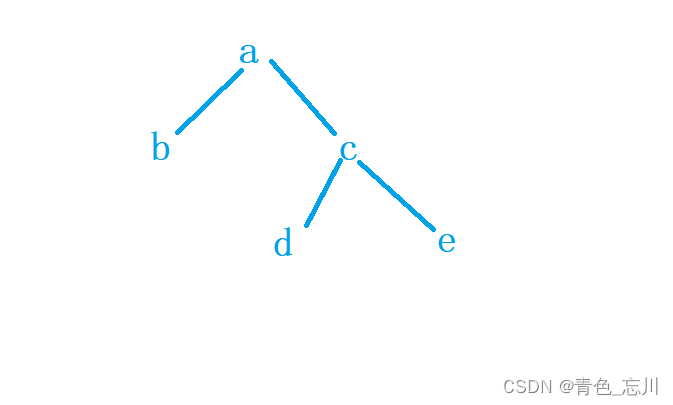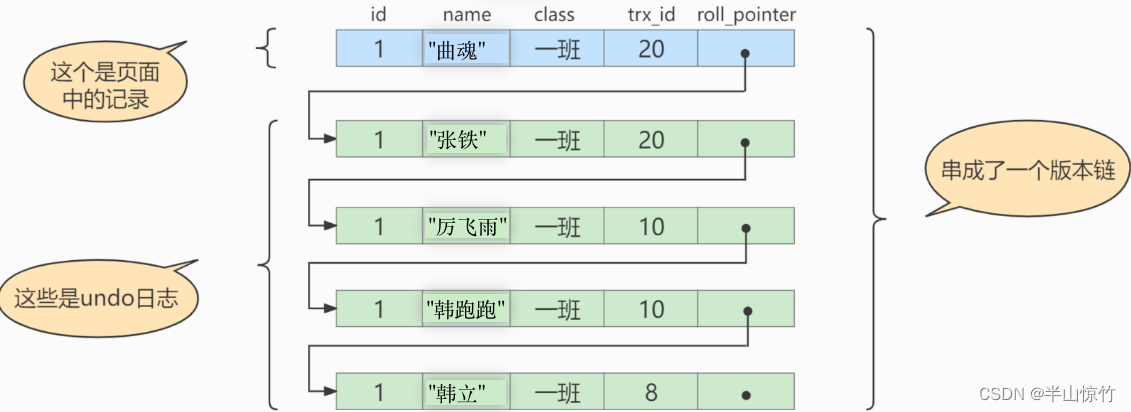类与对象
- 类的6个默认成员函数
- 构造函数
- 概念
- 特性
- 析构函数
- 概念
- 特性
- 拷贝构造函数
- 概念
- 特性
- 赋值运算符重载
- 运算符重载
- 赋值运算符重载
- 前置++ 后置++ ++重载
- const成员函数
- 取地址及const取地址操作符重载
类的6个默认成员函数
当类中没有任何成员时,称作空类
但是呢,编译器会自动生成6个默认成员函数,所以当一个类中没有任何成员时,还是存在6个默认函数的
默认成员函数:使用者没有实现,编译器自动生成;使用者自己实现,则使用以实现的
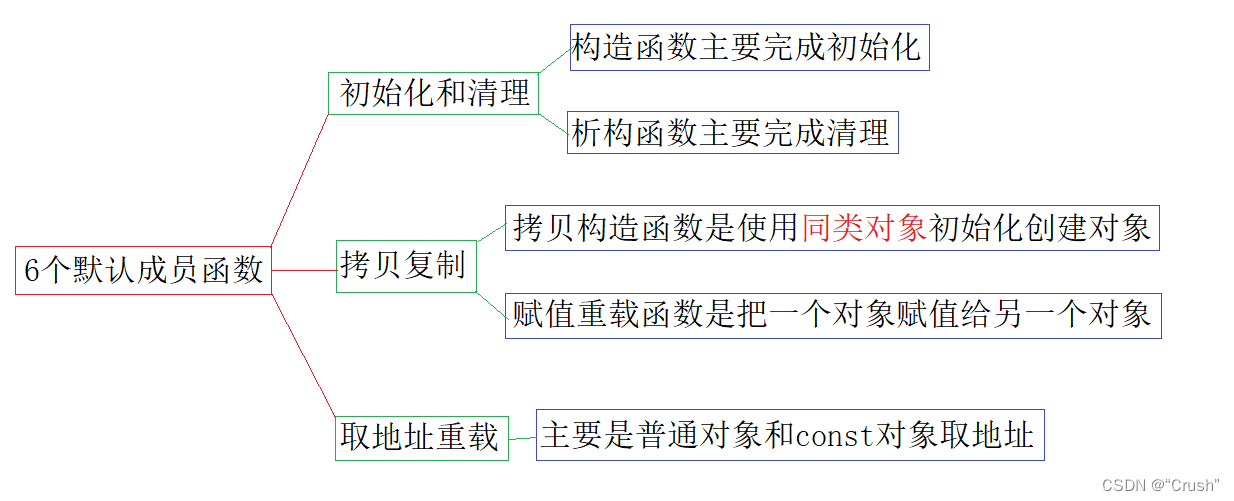
构造函数
概念
观察下面代码
class Date
{
public:
void Init(int year, int month, int day)
{
_year = year;
_month = month;
_day = day;
}
void Print()
{
cout << _year << " " << " " << _month << " " << _day << endl;
}
private:
int _year;
int _month;
int _day;
};
int main()
{
Date d1;
d1.Init(2022, 12, 4);
d1.Print();
return 0;
}
对于 Date类而言,难道只能通过共有函数 Init给对象进行初始化吗?而且如果每次创建对象都需要调用此方式初始化,是不是很麻烦呢?
由此,便引入构造函数的概念,可以在对象创建时就进行初始化
构造函数是一个特殊的成员变量,名字与类名相同,创建类类对象时由编译器自动调用,以确保,每个数据成员都有一个适当的初始值,并且在对象整个生命周期内只调用一次
功能类似于C语言中的Init
特性
构造函数是特殊的成员函数,需要注意的是,构造函数虽然名称为构成,但其功能不是开辟空间创建对象,而是初始化对象
- 函数名与类名相同
- 没有返回值
- 对象实例化(定义)时编译器会自动调用相应的构造函数
- 构造函数可以重载
class Date
{
public:
//无参构造函数
Date()
{
}
//含参构造函数
Date(int year, int month, int day)
{
_year = year;
_month = month;
_day = day;
}
void Print()
{
cout << _year << " " << _month << " " << _day << endl;
}
private:
int _year;
int _month;
int _day;
};
void test()
{
Date d1;//调用无参构造函数
d1.Print();
Date d2(2022, 12, 4);//调用含参构造函数
d2.Print();
}
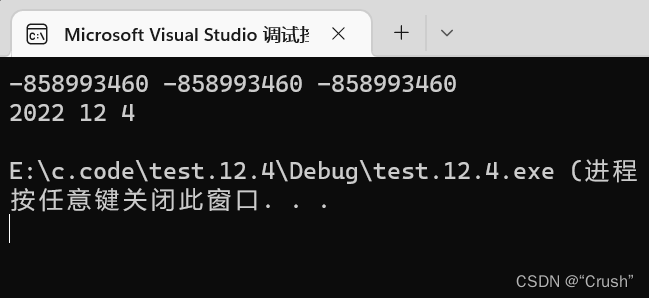
这里有一个点需要注意,Date d1调用无参构造函数时,不可以加上(),因为会造成函数声明

- 如果使用者没有在类中实现构造函数,编译器便会自动生成一个无参的默认构造函数;不过如果使用者已经实现,则编译器不会再生成
class Date
{
public:
//没有构造函数
void Print()
{
cout << _year << " " << _month << " " << _day << endl;
}
private:
int _year;
int _month;
int _day;
};
void test()
{
Date d1;
d1.Print();
}
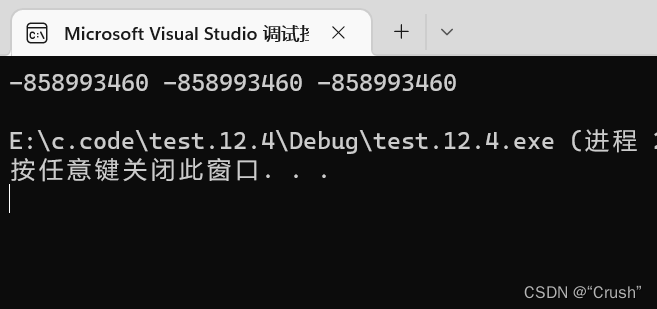
-
在5中可以观察到,当使用者不在类中实现构造函数,编译器会自动生成默认构造函数,但是呢,运行的结果却是随机值,似乎没有任何用处。既然这样的话,还不如使用者自己在类中实现需要的构造函数,但真的是如此吗???
原因是在C++中,把类型分为内置类型(基本类型)和自定义类型。内置类型:语言提供的数据类型,例如int/char/double等;自定义类型:使用者自己定义的类型,例如class/struct/union等
编译器生成的默认构造函数只会对自定义类型起作用
之后为了解决默认构造函数不处理内置类型的问题,规定内置类型成员变量在类中声明时可以进行赋值 -
只有无参构造函数,全缺省构造函数和编译器默认生成的构造函数称为默认构造函数,并且默认构造函数只能存在一个
不传参数就可以调用的构造函数,就称作默认构造
class Date
{
public:
//无参构造函数
Date()
{
_year = 2022;
_month = 12;
_day = 5;
}
//全缺省构造函数
Date(int year = 2022, int month = 12, int day = 5)
{
_year = year;
_month = month;
_day = day;
}
private:
int _year;
int _month;
int _day;
};
void test()
{
Date d;
}
因为默认构造函数只能存在一个,所以程序会崩溃

析构函数
概念
析构函数:与构造函数的功能相反,析构函数不是完成对对象本身的销毁,销毁工作是由编译器完成的。对象在销毁时会自动调用析构函数,完成对象中资源的清理工作
特性
- 析构函数名是在类名前面加上
~ - 无参数无返回值类型
- 一个类只能有一个析构函数,若使用者没有在类中实现,系统便会自动生成默认的析构函数。析构函数不能重载
- 对象生命周期结束时,编译器才会调用析构函数。这里的生命周期包括生:局部域,全局域,malloc申请的空间
class Stack
{
public:
Stack(int capacity = 4)
{
cout << "Stack(int capacity = 4)" << endl;
_a = (int*)malloc(sizeof(int) * capacity);
if (_a == nullptr)
{
perror("malloc fail");
exit(-1);
}
_top = 0;
_capacity = capacity;
}
~Stack()
{
cout << "~Stack()" << endl;
free(_a);
_a = nullptr;
_top = _capacity = 0;
}
void Push(int x)
{
//...
_a[_top++] = x;
}
private:
int* _a;
int _top;
int _capacity;
};
int main()
{
Stack sk;
sk.Push(1);
sk.Push(2);
sk.Push(3);
sk.Push(4);
return 0;
}
在创建对象的同时构造函数进行初始化,结果如下

将四个数值全部插入栈之后,结果如下

此时_top的值为4,表示此时栈中已经存在四个数值
当程序跑到return 0时,主函数生命周期结束(全局域)调用析构函数,此时监视结果如下
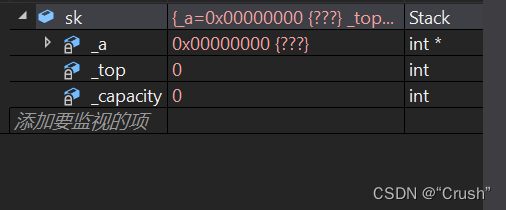
- 默认构造函数只处理自定义类型成员变量,所以类似的,编译器生成的默认析构函数,对自定义类型成员变量才会调用它的析构函数
class M
{
public:
~M()
{
cout << "~M()析构函数" << endl;
_m = 0;
}
private:
int _m;
};
class Date
{
public:
void Init(int year = 1, int month = 1, int day = 1)
{
_year = year;
_month = month;
_day = day;
}
void Print()
{
cout << _year << " " << " " << _month << " " << _day << endl;
}
private:
//内置类型
int _year;
int _month;
int _day;
//自定义类型
M _m;
};
int main()
{
Date d1;
return 0;
}

对象 d1的成员变量,包括内置类型和自定义类型。其中内置类型在 d1销毁时不需要资源清理,也就是不需要调用析构函数;自定义类型在 d1销毁时需要调用其本身的析构函数,也就是调用 M类的析构函数,从而销毁 _m。虽然 Date中没有显示析构函数,但编译器会默认生成一个析构函数,其目的是在内部调用 M的析构函数,也就解释了运行结果为什么会打印 ~M()析构函数
- 判断析构函数是否需要使用者实现的方法是,如果类中没有申请资源,析构函数可以不写,直接使用编译器默认生成的析构函数;如果有资源申请,一定要写,否则会造成资源泄漏
总结
面对需求:编译器默认生成的就可以,就不要自己写,不满足就自己写
Stack的析构函数需要自己写
Date的不需要自己写,默认生成的就可以
拷贝构造函数
概念
拷贝构造函数也称拷贝初始化,只有一个形参,且整个形参是对相同类类型对象的引用(一般由const修饰),在用已存在的类类型对象创建对象时由编译器自动调用
特性
- 拷贝构造函数是构造函数的一个重载形式
- 拷贝构造函数的参数只有一个且必须是相同类类型对象的引用;如果使用传值方式,将会引发无穷递归,编译器会报错
class Date
{
public:
Date(int year = 2022, int month = 12, int day = 5)
{
_year = year;
_month = month;
_day = day;
}
Date(const Date d)
{
_year = d._year;
_month = d._month;
_day = d._day;
}
private:
int _year;
int _month;
int _day;
};
void test()
{
Date d1;
Date d2(d1);
}

传值调用的本质就是拷贝一份数据传递给相应的函数
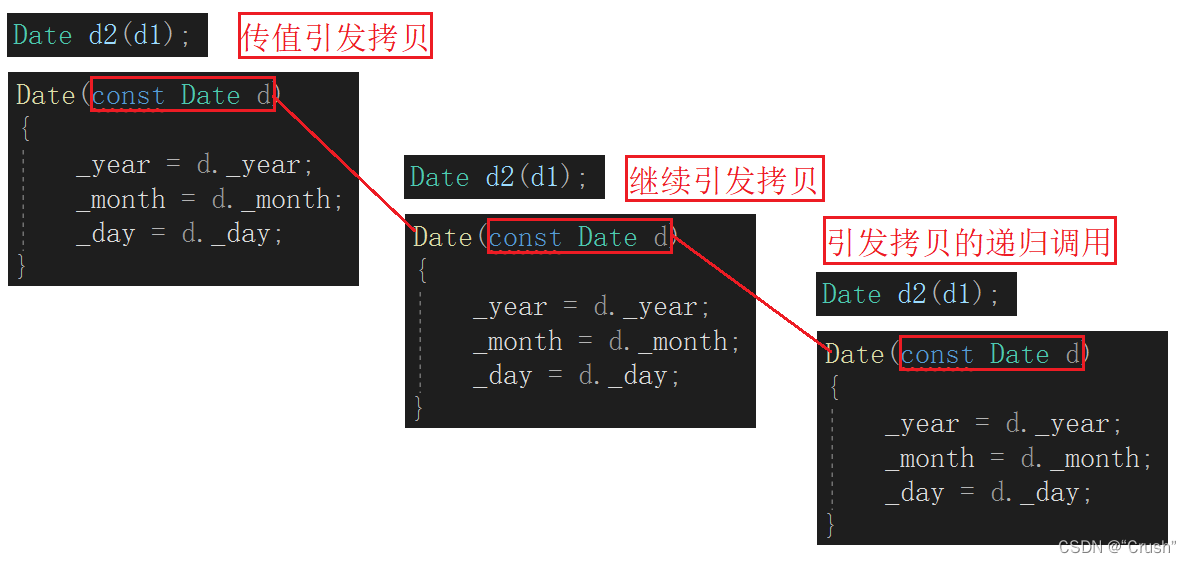
- 若使用者没有在类中实现拷贝构造函数,编译器会生成。拷贝对象时按照内存存储字节序完成拷贝,称为浅拷贝
class Date
{
public:
Date(int year = 2022, int month = 12, int day = 5)
{
_year = year;
_month = month;
_day = day;
}
private:
//内置类型
int _year;
int _month;
int _day;
};
void test()
{
Date d1;
Date d2(d1);
}
int main()
{
test();
return 0;
}
监视结果如下
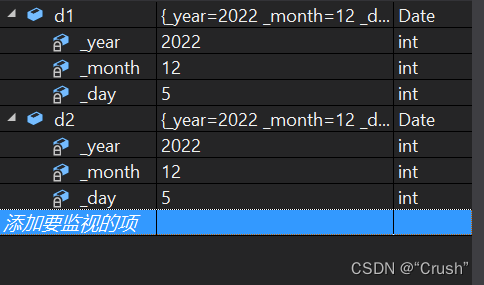
在编译器生成的默认拷贝构造函数中,内置类型按照字节方式直接拷贝,自定义类型是调用其拷贝构造函数完成拷贝
- 既然编译器生成的默认构造函数已经可以完成字节序的值拷贝,那么还有自己在类中实现的必要吗???
观察下面的代码
class Stack
{
public:
Stack(int capacity = 4)
{
cout << "Stack(int capacity = 4)" << endl;
_a = (int*)malloc(sizeof(int) * capacity);
if (_a == nullptr)
{
perror("malloc fail");
exit(-1);
}
_top = 0;
_capacity = capacity;
}
~Stack()
{
cout << "~Stack()" << endl;
free(_a);
_a = nullptr;
_top = _capacity = 0;
}
void Push(int x)
{
//...
_a[_top++] = x;
}
private:
int* _a;
int _top;
int _capacity;
};
int main()
{
Stack sk1;
sk1.Push(1);
sk1.Push(2);
sk1.Push(3);
sk1.Push(4);
Stack sk2(sk1);
return 0;
}
运行结果如下
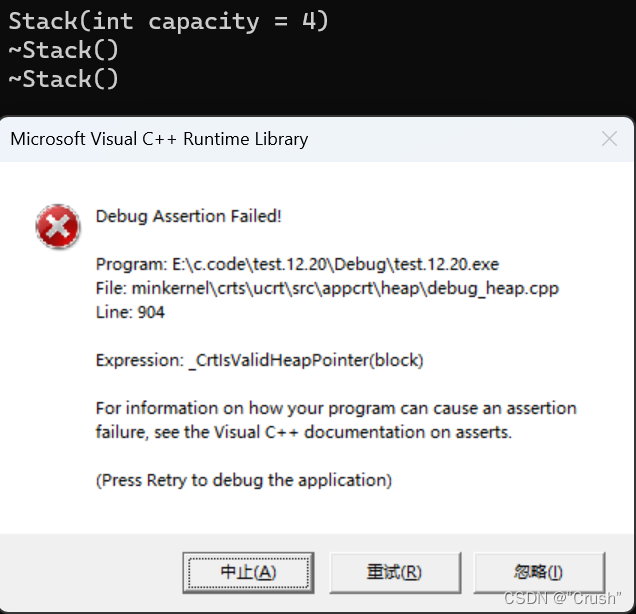
程序直接崩溃,为什么呢,上面也是没有自己写拷贝构造函数,程序正常运行,在这里为什么就不行呢
接下来用一张图来进行解释
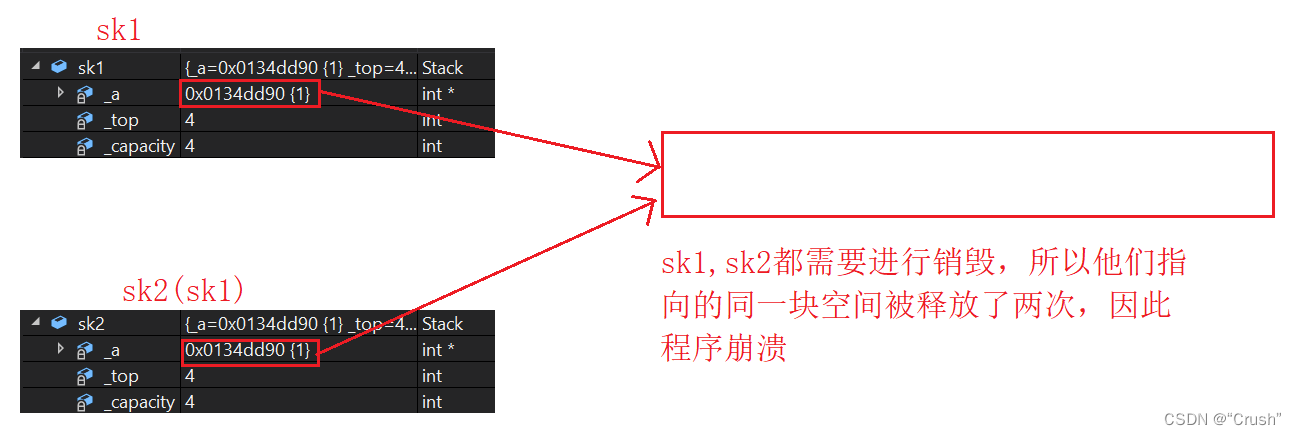
如果类中没有涉及资源申请,拷贝构造函数便不需要自己实现;如果涉及到资源申请,拷贝构造函数必须要自己实现,否则就是浅拷贝,程序便会崩溃
改进如下
Stack(const Stack& sk)
{
cout << "Stack(const Stack& sk)" << endl;
_a = (int*)malloc(sizeof(int) *sk._capacity);
if (_a == nullptr)
{
perror("malloc fail");
exit(-1);
}
memcpy(_a, sk._a, sizeof(int) * sk._top);
_top = sk._top;
_capacity = sk._capacity;
}
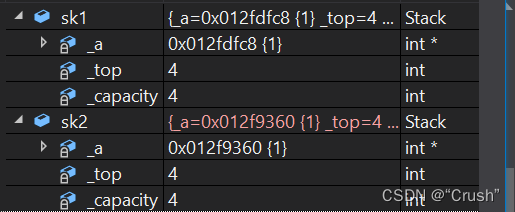
sk1,sk2中_a所指的不是同一块空间,便完成了深拷贝
需要写析构函数的类,都需要写深拷贝的拷贝构造
不需要写析构函数的类,默认生成的浅拷贝的拷贝构造就可以满足
- 拷贝构造函数使用场景
使用已存在对象创建新对象
函数参数类型是类类型对象
函数返回值类型是类类型对象
赋值运算符重载
运算符重载
为了增加代码的可读性引入运算符重载,运算符重载是具有特殊函数名的函数,也具有其返回值类型,函数名以及参数列表,其返回值类型与参数列表与普通的函数类似
函数名:关键字operator后面接需要重载的运算符符号
函数原型:返回值类型operator操作符(参数列表)
- 不能通过连接其他符号来创建新的操作符:例如
operator@ - 重载操作符必须有一个类类型参数
- 用于内置类型的运算符,其含义不能改变
- 作为类成员函数重载时,其形参看起来比操作数数目少1,因为成员函数的第一个参数为隐藏的this
.* / :: / sizeof / ?: / .这五个运算符不能重载
重载 ==
operator==
class Date
{
public:
Date(int year = 1, int month = 1, int day = 1)
{
_year = year;
_month = month;
_day = day;
}
bool operator==(const Date& d2)
{
return _year == d2._year
&& _month == d2._month
&& _day == d2._day;
}
}
private:
int _year;
int _month;
int _day;
};
int main()
{
Date d1(2022, 12, 5);
Date d2(2022, 12, 25);
cout << (d1 == d2) << endl;
return 0;
}
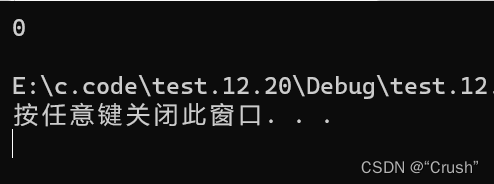
重载>
bool operator>(const Date& d2)
{
if (_year > d2._year)
{
return true;
}
else if (_year == d2._year && _month > d2._month)
{
return true;
}
else if (_year == d2._year && _month == d2._month && _day > d2._day)
{
return true;
}
return false;
}
重载>= 只需要赋用上面两种运算符即可
bool operator>=(const Date& d2)
{
return *this > d2 || *this == d2;
}
重载+=和重载+
class Date
{
public:
//判断日期的有效性
int Getmonthday(int year, int month)
{
int monthdayarray[13] = { 0,31,28,31,30,31,30,31,31,30,31,30,31 };
if (month == 2 && ((year % 4 == 0 && year % 100 != 0) || (year % 400 == 0)))
{
return 29;
}
else
{
return monthdayarray[month];
}
}
Date(int year = 1, int month = 1, int day = 1)
{
_year = year;
_month = month;
_day = day;
}
Date& operator+=(int day)
{
_day += day;
while (_day > Getmonthday(_year, _month))
{
_day -= Getmonthday(_year, _month);
_month++;
if (_month == 13)
{
++_year;
_month = 1;
}
}
return *this;
}
Date operator+(int day)
{
Date ret(*this);
ret += day;
return ret;
}
private:
int _year;
int _month;
int _day;
};
int main()
{
Date d(2022, 12, 5);
d += 50;
return 0;
}
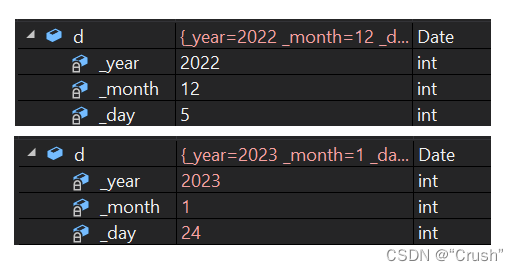
赋值运算符重载
- 赋值运算符重载格式
参数类型:const T(类名)&,传递引用可以提升传参效率
返回值类型:T(类型)&,返回引用可以提高返回的效率,有返回值目的是为了支持连续赋值
检测是否自己给自己赋值
返回this:要复合连续赋值的含义
Date类,没有资源的申请赋值重载较为简单
class Date
{
public:
//判断日期的有效性
int Getmonthday(int year, int month)
{
int monthdayarray[13] = { 0,31,28,31,30,31,30,31,31,30,31,30,31 };
if (month == 2 && ((year % 4 == 0 && year % 100 != 0) || (year % 400 == 0)))
{
return 29;
}
else
{
return monthdayarray[month];
}
}
Date(int year = 1, int month = 1, int day = 1)
{
_year = year;
_month = month;
_day = day;
}
Date& operator=(const Date& d)
{
//排除两个对象相等的情况
if (this != &d)
{
_year = d._year;
_month = d._month;
_day = d._day;
}
return *this;
}
private:
int _year;
int _month;
int _day;
};
int main()
{
Date d1(2022, 12, 5);
Date d2;
d2 = d1;
return 0;
}
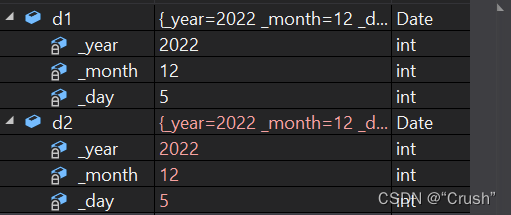
Stack类,有资源的申请,赋值重载较为复杂
class Stack
{
public:
Stack(int capacity = 4)
{
cout << "Stack(int capacity = 4)" << endl;
_a = (int*)malloc(sizeof(int) * capacity);
if (_a == nullptr)
{
perror("malloc fail");
exit(-1);
}
_top = 0;
_capacity = capacity;
}
Stack& operator=(const Stack& sk)
{
if (this != &sk)
{
free(_a);
_a = (int*)malloc(sizeof(int) * sk._capacity);
if (_a == nullptr)
{
perror("malloc fail");
exit(-1);
}
memcpy(_a, sk._a, sizeof(int) * sk._top);
_top = sk._top;
_capacity = sk._capacity;
}
return *this;
}
~Stack()
{
cout << "~Stack()" << endl;
free(_a);
_a = nullptr;
_top = _capacity = 0;
}
void Push(int x)
{
//...
_a[_top++] = x;
}
private:
int* _a;
int _top;
int _capacity;
};
int main()
{
Stack sk1;
sk1.Push(1);
sk1.Push(2);
sk1.Push(3);
Stack sk2;
sk2.Push(10);
sk2.Push(20);
sk2.Push(30);
sk1 = sk2;
return 0;
}
存在三种情况,
sk1中的_a申请的空间比sk2中的_a申请的空间大,相等,小,为了简便处理,在赋值时,先将sk1中_a申请的空间释放,接着将sk2整体拷贝给sk1即可
- 赋值运算符只能重载成类的成员函数不能重载成全局函数
因为类中的成员变量是私有的,在类外不能进行访问的
赋值运算符如果使用者没有在类中实现,编译器会生成一个默认的
- 使用者没有在类中实现赋值运算符重载时,编译器会生成一个默认的,且以值的方式逐字节拷贝(浅拷贝)。内置类型成员变量是直接赋值,而自定义类型成员变量需要调用相应类的赋值运算符重载完成赋值
既然编译器生成的默认构造函数已经可以完成字节序的值拷贝,那么还有自己在类中实现的必要吗???
这里与上面拷贝构造的思想类似,就不加赘述
如果类中没有涉及资源管理,赋值运算符不需要写;如果涉及到资源管理使用者必须在类中实现
前置++ 后置++ ++重载
先区分,前置与后置的区别,主要区别就是,返回的结果不同,前置返回的结果是++后的数值;后置返回的结果是++之前的数值,也就是本身;对于- -也是同样的道理
//前置++
Date& operator++()
{
*this += 1;
return *this;
}
//后置++,多一个参数,为了与前置区分
Date operator++(int)
{
Date ret(*this);
*this += 1;
return ret;
}
const成员函数
const修饰的成员变量称为const成员变量,const修饰成员函数,实际是修饰该成员变量隐含的this指针,表明在该成员函数中不能对类的任何成员进行修改
class Date
{
public:
Date(int year = 1, int month = 1, int day = 1)
{
_year = year;
_month = month;
_day = day;
}
void Print()
{
cout << _year << " " << _month << " " << _day << endl;
}
private:
int _year;
int _month;
int _day;
};
int main()
{
Date d1(2022, 12, 5);
d1.Print();
const Date d2;
d2.Print();
return 0;
}

改善之后
const修饰成员函数,实际是修饰该成员变量隐含的this指针
void Print()const
{
cout << _year << " " << _month << " " << _day << endl;
}

总结:
凡是内部不改变成员变量的,也就是*this对象数据的,此类成员函数都应该加上const进行修饰
取地址及const取地址操作符重载
这里两类默认成员函数一般不需要重新定义,编译器会默认生成


![[论文阅读] SqueezeSeg V1](https://img-blog.csdnimg.cn/b6c8f3c4bbe64aad88f9089dbdd848a5.png?x-oss-process=image/watermark,type_d3F5LXplbmhlaQ,shadow_50,text_Q1NETiBAd29sZl9raW5nXzU4Ng==,size_17,color_FFFFFF,t_70,g_se,x_16)
